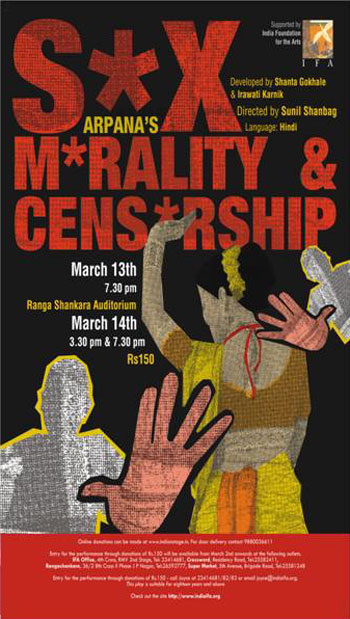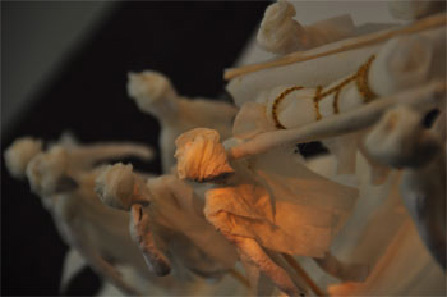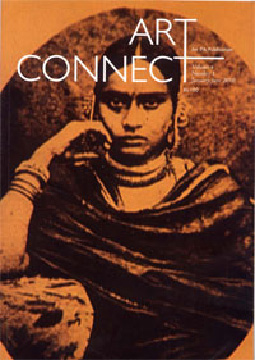|
||||||||||
| Recent Projects | ||||||||||
| New Grantees | ||||||||||
In February 2010, India Foundation for the Arts made six grants under our Arts Research and Documentation programme. Badri Narayan Tiwari from Allahabad is exploring the Bhagait folk tradition of the marginalised and Dalit; Paromita Vohra of Mumbai is working on a book on the evolution of the India documentary film and Savia Viegas of Goa traces the trajectory of Angelo da Fonseca’s work and the formation of complex national identities within colonial Portuguese Goa. The development of Marathi periodicals as a counter literary movement of the past century is the focus of Mangesh Narayan Kale’s project; Gokul TG of Kerala is conducting research on the comic strips by the internationally acclaimed filmmaker G. Aravindan and Surajit Sarkar from New Delhi examines the changing relationship of Bundeli resistance arts and their engagement with widespread technological innovations across the Narmada region of Madhya Pradesh. Under our New Performance programme we will be supporting Prabhat Bhaskaran to explore the idea of physical pain through a re-visioning of the Samuel Beckett play Act without Words I & II in Malayalam. IFA is proud to support such a diverse and talented range of artists/researchers. We look forward to working with them closely on their respective projects and wish them much success! |
||||||||||
| Public Eye | ||||||||||
|
||||||||||
 |
The Motley Theatre’s Bangalore Fundraiser | |||||||||
Naseeruddin Shah was back in Bangalore with his Motley Theatre to perform in what turned out to be our most successful fundraisers ever. Benjamin Gilani, Akash Khurana, Randeep Hooda and Naseeruddin Shah stunned the audience with a performance of Beckett’s masterpiece, Waiting for Godot, which was directed by Gilani. The performance marked thirty years of the Motley Theatre’s premiere performance of the same play. A younger generation of actors from Shah’s Motley Theatre performed the play—Manto Ismat Hazir Hain—which captures the controversies (and subsequent trials) surrounding the lives and stories of writers Saadat Hasan Manto and Ismat Chughtai. Bangalore Premiere of Sex, Morality and Censorship on March 13 and 14 In March, Sunil Shanbag brought his highly-acclaimed and entertaining play, S*X, M*rality and Cens*rship to Bangalore. A creative commentary on the bizarre and restraining censorship practices that rocked Marathi theatre in the sixties and seventies, the play has been described as “a modern seduction of ideas exploring one of the most controversial issues of our time—morality and censorship.” One of the actresses of the play, Gitanjali Kulkarni, also recently won the Best Supporting Actress honours at the META awards. |
||||||||||
| Out of Thin Air | ||||||||||
Friends of IFA were invited to a special screening of Out of Thin Air—an IFA-supported film by Samreen Farooqui and Shabani Hassanwallia about the emerging film industry in Ladakh. Poignant and humorous, the film captures how this little-known industry has transformed its home and habitants. |
||||||||||
| Announcement | ||||||||||
|
|
|||||||||
 |
Upcoming Performances
Jyoti Dogra, a grantee under the Extending Arts Practice programme will present her work The Doorway from 29 April 2010 to 1 May 2010 in Mumbai. The performance is a radical new approach to theatrical practices in the tradition of Grotowski’s Theatre Laboratory. Anurupa Roy, whose work was funded under our New Performance programme, will present her work Anecdotes and Allegories on 8 and 9 May 2010 at the India International Centre in New Delhi. Based on the Humayun-nama, written by Gulbadan Begum (Humayun’s daughter), who was also the only woman historian in Mughal India, this play blends shadow puppetry, live acting, music and multimedia. |
|||||||||
Raj Kumar Rajat, whose work was also funded under IFA’s New Performance programme, will be presenting an adaptation of the novella Suraj Ka Satwa Ghoda at the Jawahar Kala Kendra in Jaipur in late May. |
||||||||||
New Performance Funded under IFA’s New Performance programme, the second session of Gati Summer Residency will be underway from May to July in 2010. During the residency, emerging choreographers from the fields of classical or contemporary dance will work closely with mentors on new choreographic projects. The residency will conclude in New Delhi on 9 July 2010 with a performance of the projects developed during the summer. Curatorship Programme IFA is delighted to announce the launch of its Curatorship Programme in April. Funded by a generous grant from the Jamsetji Tata Trust, the Curatorship Programme has been conceived in collaboration with select institutions across the country, towards building capacity in the area of arts curatorship. Four nodal centres will each administer a series of projects that study and energise curatorial theory and practice in visual art and cinema, including designing a curriculum for a curatorial studies course and mapping exhibition policy in India. Artists and Citizens for University Autonomy (ACUA), Vadodara (Curatorial theory); Khoj International Artists’ Association, Delhi (Visual art curatorial practice); Katha Centre for Film Studies (KCFS), Mumbai (Film curatorial practice); and the Centre for Culture Media and Governance (CCMG), Jamia Millia Islamia University, Delhi (Exhibition policy) are the four nodal centres that IFA will collaborate with on this programme. |
||||||||||
| Slant, Stance | ||||||||||
Since its inception in 2005, the Extending Arts Practice programme has made twenty-one grants. From residencies and collaborations, to films and performances, research and installations...we try to support a wide range of projects. Our main concern is to nurture new art practices or new ideas around arts practice by supporting artists who look beyond disciplinary frameworks to make art that is not easily categorised or consumed by the art industry. If you are interested in making radical shifts within your own practice to impact the particular context within which you create your work, then this is the programme at IFA that can consider your project. Can you touch upon your programme’s focus on ‘cutting edge’ and ‘experimental’? Yes, words like ‘cutting-edge’ and ‘experimental’ feature prominently when describing the kind of work the programme looks to support. But honestly, these catchphrases remain meaningless unless you can locate them in the context in which the artist is working. To state the obvious, what is cutting-edge or experimental to one person might not be so to another. One way we believe we can decipher the relevance of terms like ‘experimental’ and ‘cutting edge’ with reference to the grants we make, is to look at how an artist’s process or approach creates alternative ways of thinking and seeing within her/his own immediate context. In what way do you think projects supported through the Extending Arts Practice programme make a difference to the arts constituency in general and to their own immediate context in particular? Though it would be almost impossible to offer tangible quantitative data as ‘proof’ that these projects do ‘make a difference’ to the arts community, I can, however, say quite confidently that many of the artists we have supported have been recognised for their work and there has been a marked change in their practice ever since they received IFA support. I do think the lack of visibility of these works is a problem, and this is largely due to the absence of rigorous curatorial practice in this country that may allow for more experimental works to be appropriately represented. Hopefully the Curatorship programme we are starting this year will address this in the long term. It’s important to understand that state funding and cultural policy focuses largely on supporting traditional arts and crafts, propagating a somewhat nationalist agenda by cultivating patriotism on the one hand, and cultural diplomacy on the other. As a result, many projects that might actually be at an intersection of the traditional and the contemporary are ignored, or not supported as they should be, and rarely find a suitable platform for exhibition. Though the art market does support more contemporary work, these works tend to be judged primarily for their saleability and international exportability. With the pressure to produce saleable products for local and international consumption, artistic practice is often compromised. So the ultimate aim of the programme is to intervene within this context by supporting projects that engage in critical, conceptual and contextual thinking, without having to compromise the artist’s process. How do you think extending support to collectives—residencies and curatorial projects—ties in with your programme’s areas of focus? We became interested in supporting residencies through this programme because we thought they were a great way for us to nurture individual practice through collective experience—which was the impetus behind funding the BAR1 (Bangalore Artist Residency One) India-India exchange programme in Bangalore. Young artists interested in alternative, experimental, risk-taking and boundary-crossing artistic endeavours struggle to find a place today. They are often forced to work in isolation and to seek out support structures, communities and networks via the Internet. Unfortunately, the need to create a context of critical arts practice as a valid part of the cultural landscape has not been seriously addressed in India, as opposed to Europe, the USA or East Asia. Therefore, through supporting initiatives like residency programmes and small scale curatorial projects, we look to provoke a small yet significant change within this current environment. We hope not only to encourage new modes of thinking for those interested in alternative arts practice, but to also nurture spaces that encourage collaborative and interdisciplinary work––extending one’s perspective beyond one's own immediate artistic interests. The recent interest in nurturing curatorial practice within the gallery and museum contexts is also very welcome. IFA too looks to develop curatorial theory and practice in the arts through the new Curatorship programme. Made possible by a generous donation from the Jamsetji Tata Trust, the Curatorship programme will support curatorial residencies and workshops in film and the visual arts and will eventually develop a curriculum for a curatorial studies programme. This programme is already fixed in its purview as we will be working with four nodal centers across the country, which will each conduct a series of projects. We are excited to be involved in contemporary curatorial practices in India and encouraging creative and critical thinking through both the Curatorship programme and the Extending Arts Practice programme simultaneously. This coming year is going to be quite exciting.... Can you describe the application process for the Extending Arts Practice programme? What do you look for in a proposal? We are open for applications through the year––anyone can apply at any time. We encourage people to first send in a brief concept note, or drop by and chat with us about their idea, and if their project fits within the funding parameters of the programme, we then help them develop a formal proposal. It’s important for the proposal to clearly state how the artist’s process and modes of perception will evolve through the project and the difference it will make to her/his (art) community. What we try to do is to look at whether the idea that the artist is trying to pursue is extending their practice—to the extent that through this project there will be a marked shift in their thought process and their approach to making art. So that’s really something we hope the grants we support will do for the artist. We want it to be an intervention into the artist’s practice…. On looking at the grants we’ve made so far, it’s interesting to find that we have supported work that ‘falls between the cracks’ so to speak…and these are not projects that we can easily target, which is why I hope that this conversation reaches all the potential applicants out there. Also, of course, the programme took a sabbatical last year as funds were limited so we really need to let people know that we’re now accepting applications and are on the look-out for interesting projects. |
||||||||||
---------------------------------------------- |
||||||||||
Please do send us your feedback and response at biswamit@indiaifa.org with "Feedback" in the subject line. |
||||||||||


